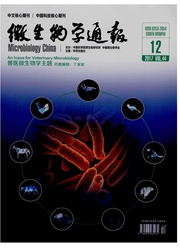

 中文摘要:
中文摘要:
多聚磷酸盐(Poly P)广泛分布于真核生物和原核生物中,是由几十个到几百个无机磷酸盐单体通过高能磷酸键聚合而成的线性多聚体。Poly P能影响细菌的毒力,有助于细菌抵抗环境中的压力刺激。在真核细胞中,Poly P与核仁的转录相关,可促进凝血和细胞分化、调节促炎反应,并和骨的重构、矿化及去矿化相关。同时,Poly P也是线粒体通透性转换孔的激活物。本文综合阐述Poly P在微生物及哺乳动物中的作用及相关机制,同时结合我们的研究工作,分析Poly P对大肠杆菌致病性的影响,以期引起研究者对Poly P的关注。
 英文摘要:
英文摘要:
Inorganic polyphosphate(Poly P), is a linear chain of tens or many hundreds of phosphate residuals linked by high-energy phosphoanhydride bonds, and widely exist in prokaryotes and eukaryotes. Many researches demonstrated that Poly P can affect the virulence of bacteria, and help bacteria to survive in nutrient-deficient environment. Poly P has been identified to be related with the RNA transcription in nucleolus of eukaryotes. Poly P can also promote cell differentiation and modulate inflammatory response. Additionally, Poly P is related to mineralization and demineralization of vertebrate bones. Poly P is the activator of mitochondrial permeability transition pore. This review is aim to summarize the impacts of Poly P to microorganism or mammal, and get more attention for the importance of Poly P.
 同期刊论文项目
同期刊论文项目
 同项目期刊论文
同项目期刊论文
 期刊信息
期刊信息
